Each time I mention that OutKast are one of my favourite groups, usually it’s met with a response somewhere along the lines of “OutKast? Those one hit-wonders who did ‘Hey Ya’?”. Granted, ‘Hey Ya’ is an incredible slice of pop which reached dizzying heights of success, but there is far much more to the group than that. This article explores the importance and influence of OutKast, an analysis of each of their albums, their enduring influence and long-lasting appeal, and why they are not only one of the best hip hop groups of all-time, but one of the most important acts in music.
OutKast were formed in East Point, Georgia in 1991. The duo consisted of André ‘André 3000’ Benjamin and Antwon ‘Big Boi’ Patton. They met in high school, and soon started participating in rap battles and making music together. Soon enough, they had teamed up with the production squad Organized Noise and became the first hip hop act to be signed to Sony Records subsidiary LaFace records. With the strength and success of their debut single ‘Players Ball’ in 1993, and the release of Southernplayalisticadillacmuzik a year later, OutKast quickly became a driving force in hip hop, swiftly building a cult following with several high profile releases. Alongside acts such as The Geto Boys, 2 Live Crew, Goodie Mob and UGK, OutKast helped to bring Southern hip hop to mainstream prominence and demonstrated that it could be as critically and commercially successful as West and East coast rap.
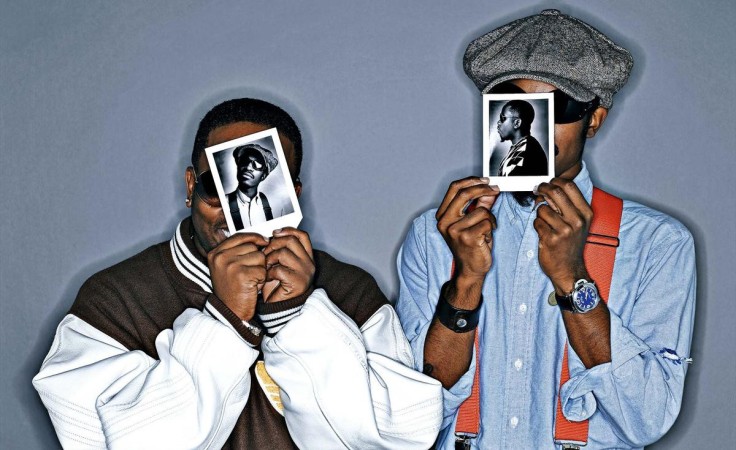
OutKast broke free of the constraints of hip hop, and the perceptions of what the genre could and should aspire to. Just as important as alternative rap innovators such as A Tribe Called Quest, The Roots, Beastie Boys and De La Soul, OutKast managed to create a unique and original style which sent shockwaves through America and beyond. Though André and Big Boi are polar opposites in terms of style, technique, musical influences, and personality, they manage to jump-off and perfectly complement each other as performers, rappers, musicians and producers. Big Boi’s rapping style is heavier and more aggressive in tone and timbre, and is often more frenetic than the smoother and more relaxed tenor of André. Lyrically, André is more abstract and figurative than Patton who habitually ‘tells it like it is’ in typical Southern fashion. Big Boi’s into his hard-hitting funk, soul and early hip hop, whilst André idolises Prince and adores psychedelic music. This bizarre combination allowed for a unique artistic vision to flourish, and OutKast created a new and cutting edge sound which relied primarily on live instrumentation instead of direct sampling. Smooth funk basslines underpin Southern soul vocal hooks and brass instrumentation, and embellishments of electronic soundscapes and spacey psychedelia characterise OutKast’s productions.
Under the influence from a range of popular culture topics, OutKast created heavily conceptual pieces of work in both their music and performance, often adopting different fashions and personas upon each touring cycle and stream of music videos. Whether it be posturing as pimps and extra-terrestrials in their early work, or discussing socio-political ideals and creating soundtracks and starring in accompanying films, the music is just one element of the complex and inimitable OutKast. Excluding the soundtrack piece Idlewild here’s a rundown of each of their studio albums:
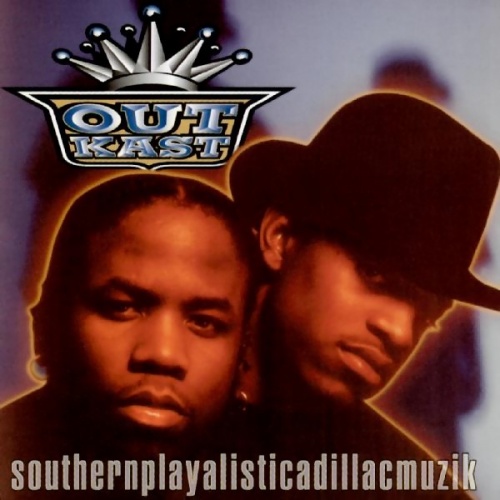
Southernplayalisticcadillacmuzik (1994)
Featuring a G-funk influenced sound, funk and soul elements, and live and organic production techniques of Organized Noize, Southernplayalisticcadillacmuzik gave the world their first taste of Outkast; a sound which was defined by heavy yet irresistible bass licks, tongue-twisting wordplay and smooth, melodic sung hooks. The social commentary regarding pimp and drug culture is rife; the group even hustled to generate funds to record, a surprising thought considering the pair were both in high school. Their debut proclamation became one of the first Southern hip hop albums to gain commercial success, and began to generate acclaim despite 1994 being a very strong year in rap with high profile releases from Nas, Beastie Boys, Common, and Gravediggaz. The lead single ‘Player’s Ball’ sold half a million copies, and the group were invited by The Notorious B.I.G. to support him on tour. However, this triumph was just the beginning for Outkast…

ATLiens (1996)
ATLiens is my personal favourite OutKast album. As the title suggests, ATLiens sounds out of this world. Defined by alien soundscapes, riddled with incredibly technical rapping and multifaceted lingo, and complete with interstellar instrumentation and newfound experimentations in production and composition, this album is an ideal starting point into OutKast’s straight-up hip hop work. It’s a tranquil trip into sci-fi conceptualism, with the psychedelic production and instrumentation offering a completely absorbing and immersive listening experience. Motivated by the naysayers of their Southern sound, Big Boi and André utilised their own recording studio to grow as artists by brushing up on their production and instrument playing skills. Their efforts began to show immediately in their music; OutKast created a labour of love which served as both a musically consistent and conceptually cohesive record which is entirely deserving of its classic status.
Aquemini (1998)
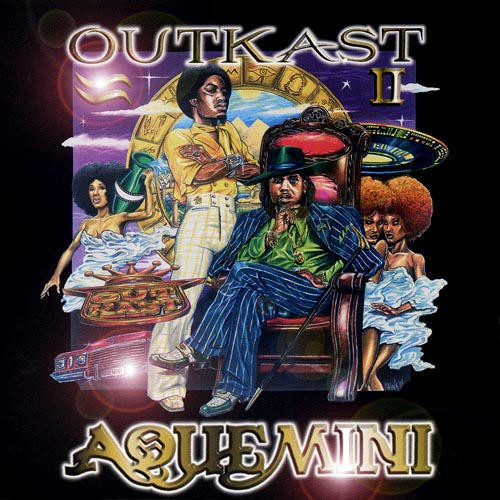
The title Aquemini stems from a portmanteau of the members Zodiac star signs, indicating that despite the duo being vastly dissimilar in terms of their musicality, vocal diction and personality, that it’s the two parts of the individual that fashion the whole to create OutKast. Aquemini mixes the eclecticism and experimentation of ATLiens with the hardcore rap of Southernplayalisticcadillacmuzik to create a record which assembles all shades of black Southern American music to a march of forward thinking hip hop. OutKast successfully merged East Coast rap with Southern hip hop in the Raekwon guesting ‘Skew It On The Bar-B’, reintroduced the hood elements in ‘Return of the ‘G’’, borrowed the spacey psych of ATLiens in the records title track, and created their magnum opus in the Curtis Mayfield worship of ‘SpottieOttieDopaliscious’. With its sprawling, eclectic sound and colossal variety of themes, instrumentation and moods, it’s no wonder that Aquemini is considered OutKast’s greatest achievement.
Stankonia (2000)
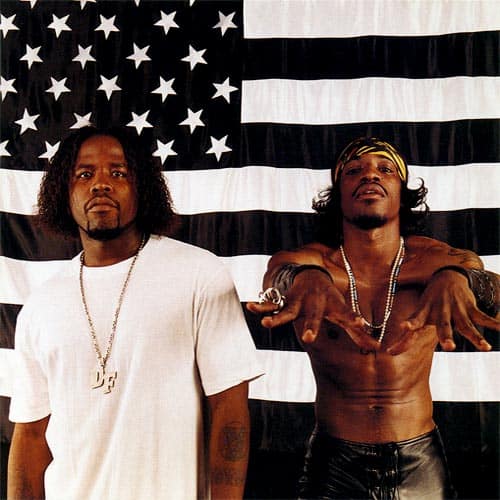
At the turn of the 21st Century, OutKast had some things to say about the state of America and the rest of the world. A glance at the album art and track-list immediately infers their political intent; with songs such as ‘Gasoline Dreams’ and ‘B.O.B.’ (‘Bombs Over Baghdad’) alongside the cover which sees the duo posturing in front of a black and white American flag, Stankonia was their biggest statement yet. It seemed impossible that the duo could top the quality and scope of Aquemini, but Outkast upped the experimentation, employing a huge variety of genres, range of tones, topics and pacing. Stankonia is the duo’s ‘heaviest’ and widescreen sounding record, thanks to its incorporation of faster tempos, distorted guitar instrumentation, and influence from genres as far afield as drum & bass, psychedelic rock and P-funk.
Speakerboxxx / The Love Below (2003)
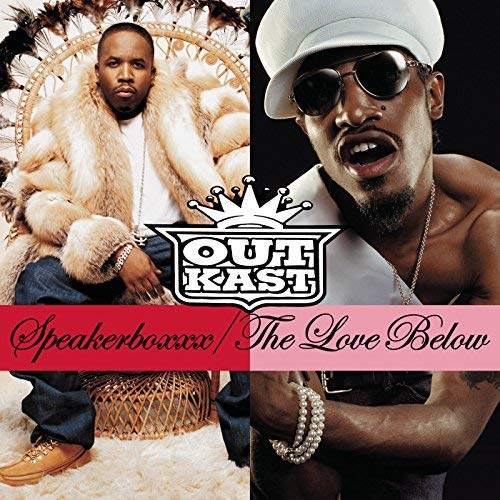
Speakerboxxx / The Love Below is the eleven-times platinum record shook the world. There was a time where you could switch over to any radio station and it was guaranteed that ‘Hey Ya’, ‘I Like The Way You Move’ or ‘Roses’ would be playing; it was absolutely massive and completely inescapable. Interestingly, this double album comprises of a side from each of the members. Characteristically, Big Boi’s Speakerboxxx disc is a funky take on Southern rap, whilst André’s The Love Below features folk, psychedelia, pop and R&B. It’s a sprawling and highly eclectic affair which showcases the influences and musical mind-set of each member over its two-hour runtime. Its ambitious scope and interpretation of various subgenres and flavours of mood is comparable to The Beatles’ White Album or Prince’s Sign O’ The Times. This is possibly the biggest album of our generation.
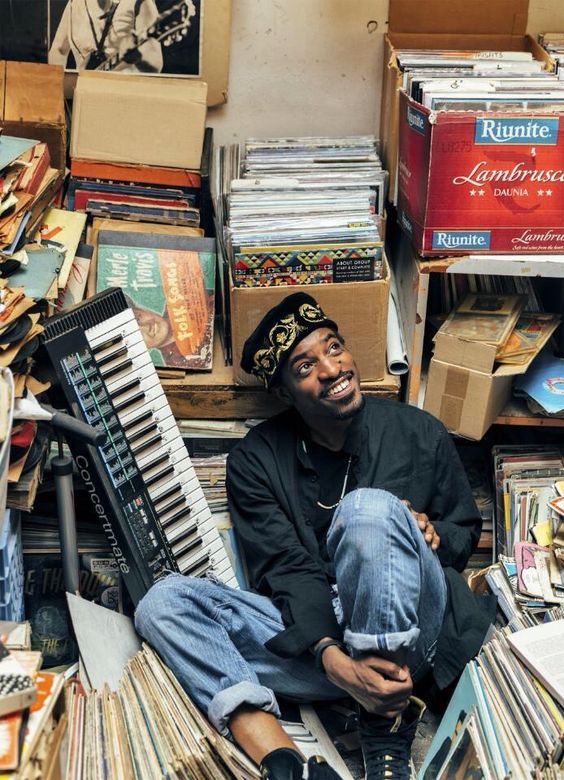
OutKast released their last effort before their hiatus in 2006, the ambitious Idlewild, a soundtrack to the film which the duo wrote and starred in. Though the critical and commercial response was muted, it still exhibited the group were out there pushing boundaries. To come hot off the heels of one of the most successful albums of all-time with a film and accompanying soundtrack is a bold statement to say the least.
During their fourteen year career, OutKast managed to push the boundaries of rap with each album release, sending shockwaves through the music scene with an influence which can still be heard today. Listen to Kendrick Lamar and tell me that André 3000 isn’t one of his biggest influences; good kid, m.A.A.d city is basically serves as the West Coast’s answer to Aquemini. There’s a huge amount of influence of OutKast in modern Southern rappers such as the likes of Isaiah Rashad, Big K.R.I.T. and CunninLynguists, who probably wouldn’t exist if it wasn’t for Dre and Antwon. Detroit’s madcap MC Danny Brown declares OutKast as a major influence, even lifting some lines from ‘B.O.B’ in ‘Today’ and stating “If you don’t know five OutKast songs, then we have a problem / If you don’t know where you come from, you can’t know where you’re going” in response to Lil Yachty’s inability to name five songs by Biggie or Tupac.
Love it or hate it, there’s no denying that trap rap is the most prevalent form of hip hop around today, and is one of the most popular and discussed genres in popular music. OutKast and their peers put the South on the map, and their gritty portrayals of urban life in Atlanta can be seen as precursors to trap music. Their debut discussed themes of living in some of the most crime-ridden and deprived areas of America, discussing topics including hustling, cooking crack and pimping in Atlanta. In ‘SpottieOttieDopalicous’, Big Boi discusses the hopelessness of youth unemployment and being confined in the trap lifestyle due to previous minor convictions; “The United Parcel Service and the people at the post office didn’t call you back because you had cloudy piss, So now you back at the trap just that, trapped”. OutKast and their peers who created the Southern/Atlanta sound opened the door for early trap artists such as T.I., Gucci Mane and Young Jeezy. Basically, the current hip hop climate may have never even come to light if it wasn’t for OutKast.
The question is, will OutKast ever end their hiatus? Will they tour or do a few festival dates? Will they record new music together? Can we expect a new album? The answer to all these is ‘probably not’. Big Boi’s got his solo career, and Dre tends to stay out of the spotlight, occasionally featuring in a film or lending a guest appearance to a track. Until then, let’s just revisit OutKast and their phenomenal body of work.






Recent Comments